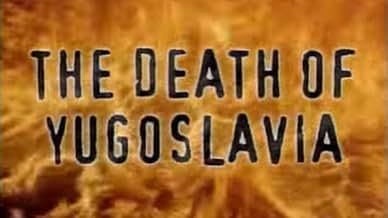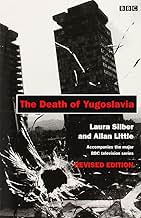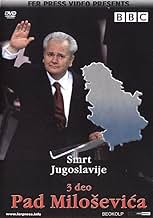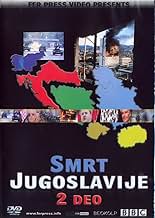The Death of Yugoslavia
- टीवी मिनी सीरीज़
- 1995–1996
- 50 मि
IMDb रेटिंग
8.6/10
1.4 हज़ार
आपकी रेटिंग
अपनी भाषा में प्लॉट जोड़ेंThis documentary series covers the struggles of the Yugoslavian people during the collapse of their country, and the subsequent wars to finally find hope with the signing of the Final Peace ... सभी पढ़ेंThis documentary series covers the struggles of the Yugoslavian people during the collapse of their country, and the subsequent wars to finally find hope with the signing of the Final Peace Accords.This documentary series covers the struggles of the Yugoslavian people during the collapse of their country, and the subsequent wars to finally find hope with the signing of the Final Peace Accords.
- 1 BAFTA अवार्ड जीते गए
- 1 जीत और कुल 1 नामांकन
एपिसोड ब्राउज़ करें
फ़ीचर्ड समीक्षाएं
Forgive my summary for being contradictory because it sums up what's wrong with this documentary series on the destruction of the Socialist Federation Of Yugoslavia . By trying to be bitingly ironic DEATH ends up contradicting itself
The format is to be blame . We see tedious talking head interviews from everybody like Slobodan Milosovic the leader of Serbia and Franjo Tudjman the leader of Croatia to leaders of the various paramilitary leaders organisations to UN soldiers to people who were kicked out their villages during the war . The irony comes in the form of Tudjman or Milisovic saying he had nothing to do with such and such an event then the interviewing cutting to a paramilitary leader saying " So the president said to me I want [ Rival ethnic group ] kicked out of the region and I will supply you with the men and guns to do it " and the interview cutting back to Milosovic or Tudjman bleating " So you see it was nothing to do with me . I was not responsible " . By trying to be ironic , if not out and out cynical , what are we audience to learn by all this ? Since the paramilitaries are very nasty people in the first place why should we entirely believe them ?
The format also makes tedious viewing . I tuned in to find out about the very human cost of war , of why socialist brothers turn against each other in an orgy of nationalism and what it was like for the combatants , mercenaries , UN personnel and innocent civilians on the front line but DEATH doesn't really concern itself with people , only politics with large chunks of running time dedicated to footage of political meetings and talking head interviews of people who attended them which leads to the detriment of other issues . The Muslim - Croat conflict of 1993 which killed thousands is relegated to a few seconds of the bridge over Mostar being shelled . I should also point out that interviewing the architects of the war in the former Yugoslavia means that we're hearing a subjective point of view , not an impartial objective one
So I'm afraid I've got to disagree with the other two reviewers ( one of whom may have got this confused with another documentary - The narrator is an English male not Christiane Amanpour ) in saying that despite - Or is it because ? - the leaders of the former Yugoslavia and international diplomats are interviewed this is a very flawed documentary series
The format is to be blame . We see tedious talking head interviews from everybody like Slobodan Milosovic the leader of Serbia and Franjo Tudjman the leader of Croatia to leaders of the various paramilitary leaders organisations to UN soldiers to people who were kicked out their villages during the war . The irony comes in the form of Tudjman or Milisovic saying he had nothing to do with such and such an event then the interviewing cutting to a paramilitary leader saying " So the president said to me I want [ Rival ethnic group ] kicked out of the region and I will supply you with the men and guns to do it " and the interview cutting back to Milosovic or Tudjman bleating " So you see it was nothing to do with me . I was not responsible " . By trying to be ironic , if not out and out cynical , what are we audience to learn by all this ? Since the paramilitaries are very nasty people in the first place why should we entirely believe them ?
The format also makes tedious viewing . I tuned in to find out about the very human cost of war , of why socialist brothers turn against each other in an orgy of nationalism and what it was like for the combatants , mercenaries , UN personnel and innocent civilians on the front line but DEATH doesn't really concern itself with people , only politics with large chunks of running time dedicated to footage of political meetings and talking head interviews of people who attended them which leads to the detriment of other issues . The Muslim - Croat conflict of 1993 which killed thousands is relegated to a few seconds of the bridge over Mostar being shelled . I should also point out that interviewing the architects of the war in the former Yugoslavia means that we're hearing a subjective point of view , not an impartial objective one
So I'm afraid I've got to disagree with the other two reviewers ( one of whom may have got this confused with another documentary - The narrator is an English male not Christiane Amanpour ) in saying that despite - Or is it because ? - the leaders of the former Yugoslavia and international diplomats are interviewed this is a very flawed documentary series
I found this series very helpful for understanding the events that led up to the wars in the 1990s. At times the analysis isn't very critical in the sense that events are shown as they happened without reflection about why they happened. It's strong suit is interviewing the principals and their comments and perceptions. One big weakness is the quality of the subtitles which were at times incomplete and even wrong. One example that comes to mind is in the first episode when they are discussing what kind of leader Stambolic is, and the subtitles say what kind of dictator. I'm shocked that the BBC paid so little attention to the subtitles which reflect a persistent bias.
This documentary series (of five episodes) is a painstakingly compiled and researched account of the extended mass-bloodshed which marked the end of the old Federal Yugoslavia and spanned almost the entire first half of the 1990's. It includes a huge wealth of news footage and interviews with involved parties both "Yugoslav" and otherwise. The only real "improvement" which could be made to this amazing achievement would be the inclusion of later developments in the Balkans since the program was made. This was indeed done in the late 1990's for a repeat showing on BBC television, but the addition of some even more recent events would help to complete this admirably detailed and fulsome piece of work. Perhaps another whole episode might be warranted? The very succinct title of this documentary was made all the more appropriate by the eventual abandonment of the term "Yugoslavia" by the now-named Federal Republic of Serbia and Montenegro - a much belated and formal admission of that which occurred years before.
This program is required viewing for anyone who wishes to know about this horrible conflict, it's causes and it's many results.
This program is required viewing for anyone who wishes to know about this horrible conflict, it's causes and it's many results.
If you are interested in the Balkan wars, then this documentary is a must. I still cannot believe that they actually managed to talk to the people who were the lead characters of these events. It is absolutely unique to hear every one of them speak about it, share their story and be filmed while doing it. Not many a documentary has managed this kind of scope and well spent effort.
Clearly, there will be truths hidden that the interviewees did not want to speak about, but one should not expect miracles. Even so, this is a genuinely fascinating documentary that anyone, who is interested in this region's history, should see.
A word of caution though, there appear to be a number of people on this board, disagreeing, denying and generally dissatisfied about any film that shows the conflict as it really was and, hence, shows Serbs in a less than a positive light.
Pay no attention, even to this day, there are people in Austria and Germany who deny the atrocities of WWII; most of these people can hardly be helped by a documentary.
Clearly, there will be truths hidden that the interviewees did not want to speak about, but one should not expect miracles. Even so, this is a genuinely fascinating documentary that anyone, who is interested in this region's history, should see.
A word of caution though, there appear to be a number of people on this board, disagreeing, denying and generally dissatisfied about any film that shows the conflict as it really was and, hence, shows Serbs in a less than a positive light.
Pay no attention, even to this day, there are people in Austria and Germany who deny the atrocities of WWII; most of these people can hardly be helped by a documentary.
As I am very interested in the wars in the former Yugoslavia I watched this quite famous series and expected an unbiased series which would deliver a lot of facts. However in this regard the series is very disappointing as it does not deliver facts but instead speculations and assumptions are shown as undeniable facts.
The series consists mainly of interviews with the main leaders of the warring factions and the UN representatives. This is the best part about this series as it shows us the different opinions on the events that happened. In between this interviews a narrator tells the viewer what happened and here this series fails on many occasions as it quite often presents assumptions as facts or tells us about the intentions behind certain events but completely lacks evidence for this. The most obvious assumption is the alleged deal between Milosevic and Tudjman about the division of Bosnia. The series tells us that this deal was the main reason for the war in Bosnia. What it does not tell us is that there is no evidence for such a deal. Mesic and Karadzic are interviewed about this deal however they both were not present during the Milosevic/Tudjman meeting. Moreover the director of this series, probably to support his thesis shows us the meeting right before the war in Bosnia, however the meeting took place before the war in Croatia. Also Tudjman's comment about Bosnia was intensified by the not very exact translation. When he said that "another" option was the division of Bosnia, it was translated by the narrator as "the only option" was the division. I realized the same thing several times while watching this series, that certain statements were intensified by a slightly inaccurate translation (I watched the German version, maybe the others are more accurate).
On other occasions the series is very one sided and superficial, for instance when it tells that the Serbs were afraid of Croatia because the Croat Coat of arms (the red and white checkerboard) was used during WWII. The series does not loose a single word on the fact that the checkerboard was used for hundreds of years, even in Yugoslavia, which renders the narrator's thesis that the checkerboard was the equivalent to the swastika completely wrong (Actually the U was the equivalent to the swastika).
In the end this series is interesting because of the interviews and some interesting footage, which is the reason why i gave it 3 out of 10. I do not agree with the previous reviewer that the documentary is flawed because of this. There is no ultimate truth about Yugoslavia, so by interviewing people from each side you get as close as possible. Another way would be to deliver facts like documents or audio/video footage to support the comments by the narrator on certain events and here this series fails almost completely.
The series consists mainly of interviews with the main leaders of the warring factions and the UN representatives. This is the best part about this series as it shows us the different opinions on the events that happened. In between this interviews a narrator tells the viewer what happened and here this series fails on many occasions as it quite often presents assumptions as facts or tells us about the intentions behind certain events but completely lacks evidence for this. The most obvious assumption is the alleged deal between Milosevic and Tudjman about the division of Bosnia. The series tells us that this deal was the main reason for the war in Bosnia. What it does not tell us is that there is no evidence for such a deal. Mesic and Karadzic are interviewed about this deal however they both were not present during the Milosevic/Tudjman meeting. Moreover the director of this series, probably to support his thesis shows us the meeting right before the war in Bosnia, however the meeting took place before the war in Croatia. Also Tudjman's comment about Bosnia was intensified by the not very exact translation. When he said that "another" option was the division of Bosnia, it was translated by the narrator as "the only option" was the division. I realized the same thing several times while watching this series, that certain statements were intensified by a slightly inaccurate translation (I watched the German version, maybe the others are more accurate).
On other occasions the series is very one sided and superficial, for instance when it tells that the Serbs were afraid of Croatia because the Croat Coat of arms (the red and white checkerboard) was used during WWII. The series does not loose a single word on the fact that the checkerboard was used for hundreds of years, even in Yugoslavia, which renders the narrator's thesis that the checkerboard was the equivalent to the swastika completely wrong (Actually the U was the equivalent to the swastika).
In the end this series is interesting because of the interviews and some interesting footage, which is the reason why i gave it 3 out of 10. I do not agree with the previous reviewer that the documentary is flawed because of this. There is no ultimate truth about Yugoslavia, so by interviewing people from each side you get as close as possible. Another way would be to deliver facts like documents or audio/video footage to support the comments by the narrator on certain events and here this series fails almost completely.
क्या आपको पता है
- ट्रिवियाInterviews from the series have been used by the International Criminal Tribunal for the former Yugoslavia in war crimes prosecutions.
- कनेक्शनFeatured in Barend en Van Dorp: 14 मई 1999 को प्रसारित एपिसोड (1999)
टॉप पसंद
रेटिंग देने के लिए साइन-इन करें और वैयक्तिकृत सुझावों के लिए वॉचलिस्ट करें
- How many seasons does The Death of Yugoslavia have?Alexa द्वारा संचालित
विवरण
- चलने की अवधि
- 50 मि
- रंग
इस पेज में योगदान दें
किसी बदलाव का सुझाव दें या अनुपलब्ध कॉन्टेंट जोड़ें



















